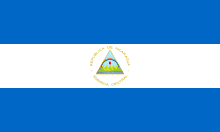News Release from windfair.net
Wind Industry Profile of
Will the US soon stand side by side with Syria?
Only two countries in the world have not signed the Paris Climate Agreement in 2015: Nicaragua and Syria. While the long-lasting civil war in Syria is considered to be the cause of the country's non-participation in the negotiations, Nicaragua refused for another reason: the agreement did not go far enough for President Daniel Ortega's government.
But now he has changed his mind: "We will soon sign the treaty," Ortega said at a meeting with representatives of the World Bank, according to German media outlet Welt. This is apparently to be done out of solidarity with the countries that are already suffering massively from climate change.
Nicaragua had called for stricter rules and higher penalties in 2015 for non-compliance with climate sins. Paul Oquist, who sat at the negotiating table for Nicaragua in 2015, expressed reservations at the time about the commitment of individual countries to Democracy Now: "These voluntary commitments don’t work. Right now we’re looking at a 3-degree world, and that is catastrophic and unacceptable."
 Nicaragua is one of the poorest countries in the world. According to the WHO, 50 percent of the 6.1 million inhabitants live in poverty. However, the country has been able to catch up enormously in the area of renewable energies in recent years: while 70 percent of its energy was obtained from imported oil in 2008, Nicaragua expects to generate 90 percent of its energy from renewable energies by 2020. Of this, 48.3 percent is attributable to hydroelectric dams, 13.2 percent to biomass, 11.2 percent to wind energy, 10.6 percent to geothermal energy and 5.8 percent to solar energy, as reported by the amerika21 news portal. „Nicaragua, Brazil and Uruguay are examples of this transition process," explained Achim Steiner, Director of the UN Environment Programme (PNUMA), in January.
Nicaragua is one of the poorest countries in the world. According to the WHO, 50 percent of the 6.1 million inhabitants live in poverty. However, the country has been able to catch up enormously in the area of renewable energies in recent years: while 70 percent of its energy was obtained from imported oil in 2008, Nicaragua expects to generate 90 percent of its energy from renewable energies by 2020. Of this, 48.3 percent is attributable to hydroelectric dams, 13.2 percent to biomass, 11.2 percent to wind energy, 10.6 percent to geothermal energy and 5.8 percent to solar energy, as reported by the amerika21 news portal. „Nicaragua, Brazil and Uruguay are examples of this transition process," explained Achim Steiner, Director of the UN Environment Programme (PNUMA), in January.
No wonder that the country can now confidently make demands for stricter rules. Especially since the other side is also known: the population has often suffered natural disasters such as earthquakes, volcanic eruptions or hurricanes. In 1998, hurricane Mitch devastated the country and left more than 10,000 dead.
 Syria is currently the only other country which has not signed the Paris Agreement. However, a prominent partner is likely to be found soon: if Donald Trump follows his announcement from June, the US will leave the agreement.
Syria is currently the only other country which has not signed the Paris Agreement. However, a prominent partner is likely to be found soon: if Donald Trump follows his announcement from June, the US will leave the agreement.
Trump originally wanted to use this announcement to exert pressure and force renegotiations: The goal was a better deal for the US. But the actual intention behind this was quite different: climate protection in the USA should be undermined by less stringent regulations. Trump is not only a well-known sceptic about climate change himself, but he also unites a concentrated economic power of fossil energy producers, who already supported him in the election campaign with decent money. However, the top European economic powers Germany, France and Italy quickly made it very clear at the time that there would be no renegotiations.
The US did not start a new attempt until last weekend, when high-ranking diplomats, according to the Guardian, indicated that the possibility of remaining in the agreement would exist. In his speech to the UN General Assembly, however, French President Emmanuel Macron once again rejected possible renegotiations: "This agreement will not be renegotiated", but the door is open for the Americans to submit to the Paris guidelines again, as French media reported.
- Author:
- Katrin Radtke
- Email:
- press@windfair.net
- Keywords:
- Paris Climate Agreement, Nicaragua, Syria, USA, Donald Trump, Emmanuel Macron, UN

























